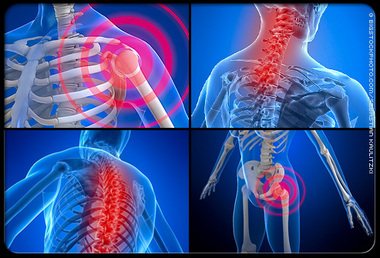Fibromyalgia Overview

Trigger Point toxin build-up at muscle attachment points, feels like joint problems.
Fibromyalgia is an illness that causes chronic pain in muscles and ligaments. Although this disorder affects about 4 million Americans, the vast majority of them are women in their mid-30s to late-50s.
In addition to muscular pain and stiffness, this ailment can also cause fatigue, sleep problems, depression, and an inability to think clearly.
Fibromyalgia Causes
While there is [as of yet] no known cause for fibromyalgia, recent research has revealed some new facts about the disease. One of the new discoveries is that people with fibromyalgia process pain differently. The level of chemical in the cerebrospinal fluid(CSF) called substance P, which transmits pain impulses to the brain, is three times higher in people with the disease than in those who do not have the condition. This likely causes someone with fibromyalgia to experience pain more intensely.
Other researchers believe fibromyalgia is caused by a lack of deep sleep. It is during stage 4 sleep that muscles recover from the prior day's activity, and the body refreshes itself. Sleep studies show that as people with fibromyalgia enter stage 4 sleep, they become more aroused and stay in a lighter form of sleep. Even though they may sleep for a long period of time, they get poor quality sleep. Also, when researchers took normal volunteers and did not allow them to enter into stage 4 sleep, they developed symptoms similar to those of fibromyalgia.
Fibromyalgia Symptoms
In addition to muscular pain and stiffness, this ailment can also cause fatigue, sleep problems, depression, and an inability to think clearly.
Fibromyalgia Causes
While there is [as of yet] no known cause for fibromyalgia, recent research has revealed some new facts about the disease. One of the new discoveries is that people with fibromyalgia process pain differently. The level of chemical in the cerebrospinal fluid(CSF) called substance P, which transmits pain impulses to the brain, is three times higher in people with the disease than in those who do not have the condition. This likely causes someone with fibromyalgia to experience pain more intensely.
Other researchers believe fibromyalgia is caused by a lack of deep sleep. It is during stage 4 sleep that muscles recover from the prior day's activity, and the body refreshes itself. Sleep studies show that as people with fibromyalgia enter stage 4 sleep, they become more aroused and stay in a lighter form of sleep. Even though they may sleep for a long period of time, they get poor quality sleep. Also, when researchers took normal volunteers and did not allow them to enter into stage 4 sleep, they developed symptoms similar to those of fibromyalgia.
Fibromyalgia Symptoms
- Pain: The most prominent symptom of fibromyalgia is pain. Unlike arthritis, the discomfort is not in the joints but in the muscles and ligaments. The pain is commonly located in the neck, shoulders, back, and hips. The tenderness is worse in the mornings and has been described as flu-like, burning, throbbing, aching, or stabbing.
- Fatigue: Another frequent complaint associated with fibromyalgia is fatigue. In fact, it occurs so commonly that some doctors think fibromyalgia and chronic fatigue syndrome are the same disease. The severity of the fatigue can range from mild to incapacitating. In its worse form, fatigue can be so debilitating that some people have trouble keeping their jobs. No amount of sleep at night or rest during the day is helpful for relief.
- Fibrofog: Another common symptom is a mental haziness some people call fibrofog. This refers to the inability to concentrate, memory loss, and depression that occurs with fibromyalgia.
- Other symptoms associated with fibromyalgia are insomnia, headaches, nervousness, numbness, dizziness, and intestinal disturbances.
To read the entire article click here: http://www.emedicinehealth.com/fibromyalgia/article_em.htm
